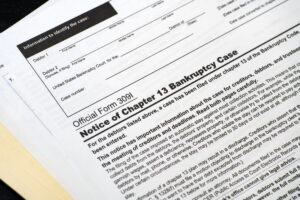
The number one question I get on Fridays is, “can I file bankruptcy on a garnishment?” Fridays are paydays. And payday may be the first time you learn that a creditor is garnishing you. Like a foul ball into left field while you’re looking down at your nachos instead of watching the game, an unexpected garnishment (really, even an expected garnishment) can really mess up your weekend.
Suddenly, your paycheck is a lot lighter than what you were expecting. Now you’re wondering how you’re going to pay your bills or even get groceries and fill your gas tank.
Besides affecting your paycheck, garnishment can also affect your emotional well-being. It can make you feel embarrassed and depressed. It can also lower your motivation at work.
What Is A Garnishment?
A garnishment happens when a creditor takes money (from your paycheck or bank account) after the creditor has gotten a court order that states that you owe the creditor money for a debt.
If the court has issued a garnishment order, then you’ve passed the point in time where you can argue that you owe the debt. The court has already decided in the creditor’s favor. If you didn’t respond to the lawsuit when it was served, you don’t get any warning when the garnishment comes.
How Much Can A Creditor Garnish?
In Colorado, creditors can take 20% of your take home pay. That’s a big chunk if you’re living paycheck to paycheck. It’s also enough to snowball into bigger problems, like getting behind on your rent or car payment.
If a creditor garnishes a bank account, you have a bigger problem. The creditor will serve your bank with a garnishment order, and the bank is required to freeze all funds you have in that account on that day. If the money in the account is from your wages, the creditor can only have 20% of what’s in there. Money is from Social Security, worker compensation, or unemployment benefits is protected. Money from something like an inheritance or tax refund is not protected.
The problem is that you have to go to court to show that some, if not all, of what was frozen in your bank account is protected. However, you may not be able to get in front of a judge or magistrate for several days or a few weeks. In the meantime, you won’t have access to the money you need for food, rent, car payments, and other necessities. You can also argue that the Colorado Revised Statute Section 13-54-102(w) protects up to $2,500.00 in your bank accounts (that’s $2,500.00 whether it’s in one account or several).
Can I File Bankruptcy On A Garnishment?
Bankruptcy is the most powerful tool you have to fight overwhelming debt. It can eliminate most debts and stop all collection action. It can stop foreclosure, repossession, and garnishment.
Bankruptcy will stop garnishment in its tracks. The moment your attorney uploads your petition to the bankruptcy court’s website, all collection action has to stop, including garnishment.
Here’s the catch, though: you can’t stop a garnishment until your case is filed with the bankruptcy court. Hiring a bankruptcy lawyer doesn’t stop garnishment. First, we need to prepare your petition. We can’t do that until you’ve provided all the information we need. We’ll pull a credit report, but that is just some of the information the bankruptcy court requires. Once we prepare the petition, we’ll need to schedule a time to review it with you and get your signature. As you can see, it could take some time before your case is filed and the garnishment can stop.
Can A Savings Account Be Garnished?
Absolutely. Any depository account that has funds from something that is not exempt (protected) is at risk of garnishment.
Talk To An Experienced Denver, Colorado Bankruptcy Lawyer About How To Stop A Garnishment
Stopping a garnishment is just one reason to consider bankruptcy to eliminate overwhelming debt. When you come in for a consultation with an experienced Chapter 7 and Chapter 13 bankruptcy attorney, we’ll go over all of your options and talk about what debts you can and cannot eliminate. The easiest way to schedule an appointment for a time that is convenient for you is by clicking here.
Check out our client reviews on Google, Facebook, and Avvo!
How To Stop A Garnishment In Colorado
Having Your Check Garnished – 5 Things You Should Know
Does A Creditor Have To Serve Me Before It Can Garnish Me?
How To Stop Creditors From Garnishing Federal Benefits


